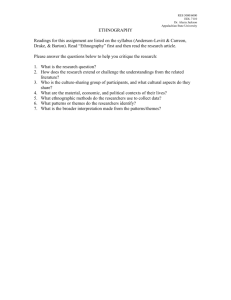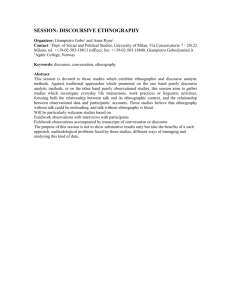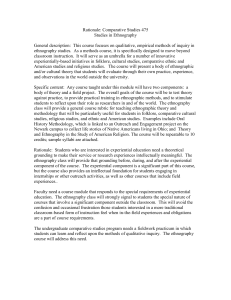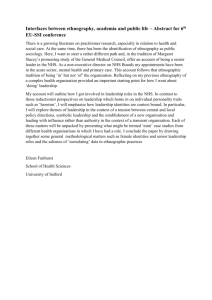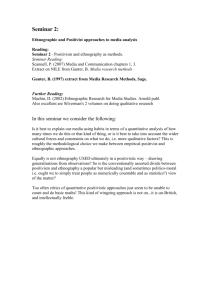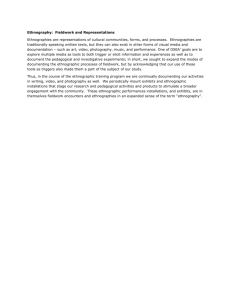Syllabus - Department of Religious Studies
advertisement
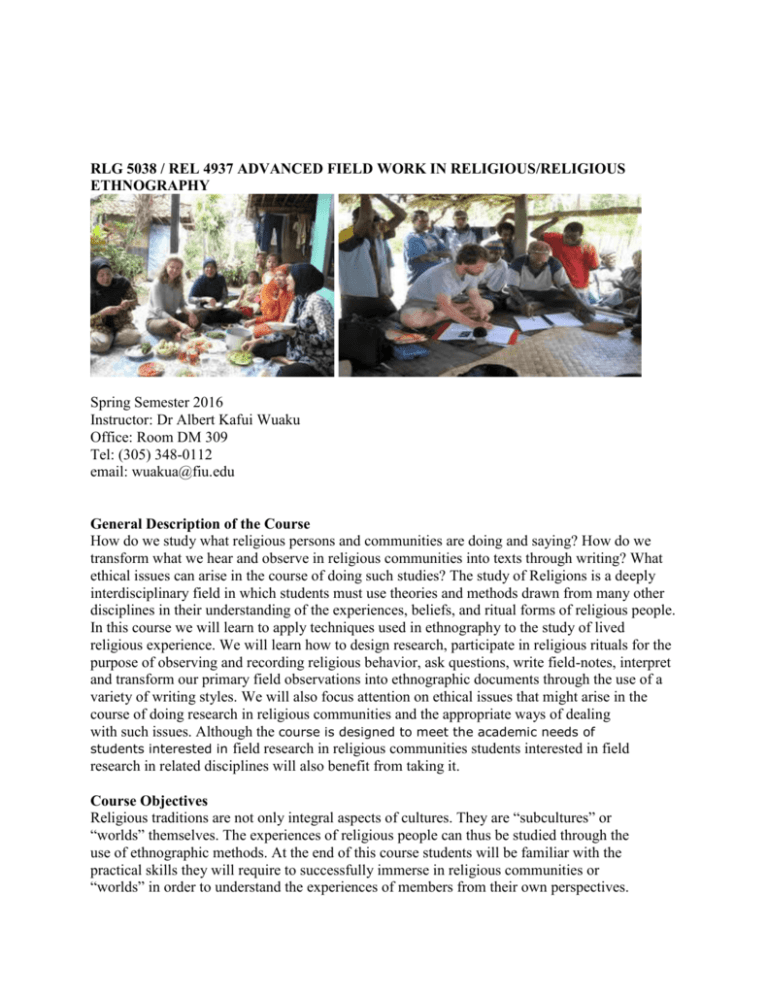
RLG 5038 / REL 4937 ADVANCED FIELD WORK IN RELIGIOUS/RELIGIOUS ETHNOGRAPHY Spring Semester 2016 Instructor: Dr Albert Kafui Wuaku Office: Room DM 309 Tel: (305) 348-0112 email: wuakua@fiu.edu General Description of the Course How do we study what religious persons and communities are doing and saying? How do we transform what we hear and observe in religious communities into texts through writing? What ethical issues can arise in the course of doing such studies? The study of Religions is a deeply interdisciplinary field in which students must use theories and methods drawn from many other disciplines in their understanding of the experiences, beliefs, and ritual forms of religious people. In this course we will learn to apply techniques used in ethnography to the study of lived religious experience. We will learn how to design research, participate in religious rituals for the purpose of observing and recording religious behavior, ask questions, write field-notes, interpret and transform our primary field observations into ethnographic documents through the use of a variety of writing styles. We will also focus attention on ethical issues that might arise in the course of doing research in religious communities and the appropriate ways of dealing with such issues. Although the course is designed to meet the academic needs of students interested in field research in religious communities students interested in field research in related disciplines will also benefit from taking it. Course Objectives Religious traditions are not only integral aspects of cultures. They are “subcultures” or “worlds” themselves. The experiences of religious people can thus be studied through the use of ethnographic methods. At the end of this course students will be familiar with the practical skills they will require to successfully immerse in religious communities or “worlds” in order to understand the experiences of members from their own perspectives. Students will also learn skills in writing and in appraising ethnographies on religious and other related human experiences. A note on Textbooks and essays This course is about practical techniques and skills used in studying human communities and how they can be applied in the study of religious communities. The text and essays on which lectures and class discussions will be based are not necessarily on religious phenomena but a diverse range of human experiences and settings. Students will be expected to glean from these readings insights they can apply in the study of religious phenomena. Prescribed Textbook 1. Hammersley, M & Atkinson P. Ethnography: Principles in Practice. [Contemporary Edition] Routledge, Taylor and Francis Group, 2005. OTHER RELEVANT TEXTS [YOU DO NOT NEED TO PURCHASE THEM] . William B. Shaffir and Robert A. Stebbins (Eds.). Experiencing Field Work: An Inside View of Qualitative Research. London: Sage Publications, 1991. . James P. Spradley. The Ethnographic Interview. Canada: Wadsworth Group, 1979. Robert M. Emerson; Rachel L. Fretz and Linda L. Shaw. Writing Ethnographic Field Notes. Chicago: University of Chicago Press, 1995. James Clifford and George E. Marcus (Eds.). Writing Culture: The Poetics and Politics of Ethnography. Berkeley, Los Angeles, London: University of California Press, 1986. Course Requirements Class attendance and participation: All must attend class regularly and punctually. Only three unexcused absences will go without penalty. Any additional unexcused absence will cause a drop in your final grade, A to an A-, an A- to a B+, etc. Habitual lateness will also impact your grade negatively. If you cannot come to class, let the professor know beforehand via email and explain why. Attendance will be taken at the beginning of each class. There will be two take home exams Students will be expected to design, conduct and report on mini research projects. Students will review a religious ethnography of their choice Grading and weights. The progress of students and their understanding of the course material will be determined based on attendance and participation in class discussions, tests, presentations based on projects and a final report. Below are the percentage weights: Attendance and Class participation: 10% Research Proposal/and presentation: 5% Bi weekly Reports on progress in Fieldwork: 15% 2 Exams- [mid Term and Finals [20 each] Review of Religious Ethnography-10% Final Research report/presentation: 20% ATTENDANCE AND CLASS PARTICIPATION Student will be expected to contribute to class discussion. This will be based on the chapters in the prescribed text book for the course and any other reading the professor posts on black board. TAKE-HOME EXAMS Each exam will comprise 4 essay questions, out of which a student would be expected to answer two questions. Students have one week to complete the exams and submit them on Turn it in. Questions for the undergraduate take home exams will be different from those of the graduate exams. . THE RESEARCH PROJECT Each student will design and implement a small fieldwork project based on observation and interviewing. This project can be done individually or in a team with one or more partners. Students will submit a research proposal. In this proposal the student must state the project topic, provide a summary of what the project will involve, and state the research questions. Topics are open but students must focus on a religious phenomenon, e.g. local constructions of religious identities [that is, a specific religious community], experiences and the life histories of particular individuals associated with specific religious communities, the life history and daily life of a key religious personality etc. Bi weekly Submissions- individual students or groups will keep a field note book during the course of the semester and samples of entries about their research projects, both as they are formulating them and as they are conducting the research will be submitted to the professor bi weekly for grading. This should include notes taken during field interviews, transcribed interviews if any or simply summaries, data interpretations and analyses, and other relevant experiences. The final report will be presented in class at the end of the semester. REVIEW OF A RELIGIOUS ETHNOGRAPHY Students can choose their own ethnographies, but must consult with the professor first. Below is a short list of a few I have enjoyed reading. Of course they are all in my areas of expertise. McCarthy Karen. Mama Lola: A Vodou Priestess in Brooklyn. Berkeley, Los Angeles, London: University Of California Press, 2001. Masquelier A. Prayer has Spoiled Everything: Possession Power and Identity in an Islamic Town of Niger. Durham and London: Duke University Press, 2001 Meyer Birgit Translating The devil: Religion and Modernity Among The Ewe in Ghana Edinburg: Edinburg University Press, 1999. Narayan Kirin. Story Tellers, Saints and Scoundrels: Folk Narrative in Hindu Religious Teachingv Philadelphia : University of Pennsylvania Press, 1989. . Richman Karen E. Migration and Vodou. Gainesville: University of Florida Press, 2006. SCHEDULE OF TOPICS Week One: Introductions, description of course and course requirements and other matters. Week Two: On ethnography: theoretical questions, the difference between quantitative and Qualitative research, Designing research. Readings: Chapters 1&2 of Ethnography: Principles in Practice. Introduction of Experiencing Field Work: An Inside View of Qualitative Research. Chapters 1, 2, 3, and 10 of Writing Culture: The Poetics and Politics of Ethnography. Week Three: Continuing On ethnography. Week Four: Students present research proposals in class [Note-proposal should not be more than 3 pages-font 12 double space] Week Five: Doing research in religious communities-entering, observing, asking questions and Establishing and maintaining relationships with members Readings: Chapters 3, 4, 5&6 of Ethnography: Principles in Practice. Essays 1, 2, 3, 5, 6, 13 & 14 of Experiencing Field Work: An Inside View of Qualitative Research. The Ethnographic Interview. [Students expected to begin fieldwork on their projects] Week Six: Doing research in religious communities-entering, observing, asking Questions and establishing and maintaining relationships with members-Contd Week Seven: Doing research in religious communities-entering, observing, asking Questions and establishing and maintaining relationships with members-Contd First Take home examWeek Eight: Writing what we see and hear---field notesReadings: Chapter 7 of Ethnography: Principles in Practice. Writing Ethnographic Field Notes. Week Nine: Analyzing our observations Readings: Chapter 8 of Ethnography: Principles in Practice. Submission of Review of Religious Ethnography Week Ten: Writing the textReading: Chapter 9 of Ethnography: Principles in Practice. Review of Religious Ethnography Due. Week Eleven: Ethical issues Reading: Chapter 10 of Ethnography: Principles in Practice. Second Take Home Week Twelve: Class Presentations based on fieldwork Week Thirteen: Class Presentations Week Fourteen: Class Presentations IMPORTANT NOTE: The professor reserves the right to amend this syllabus as determined by the demands of the course during the semester.
